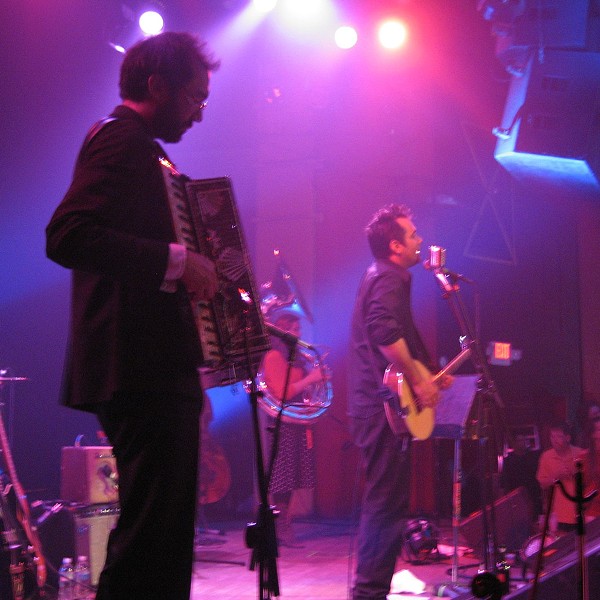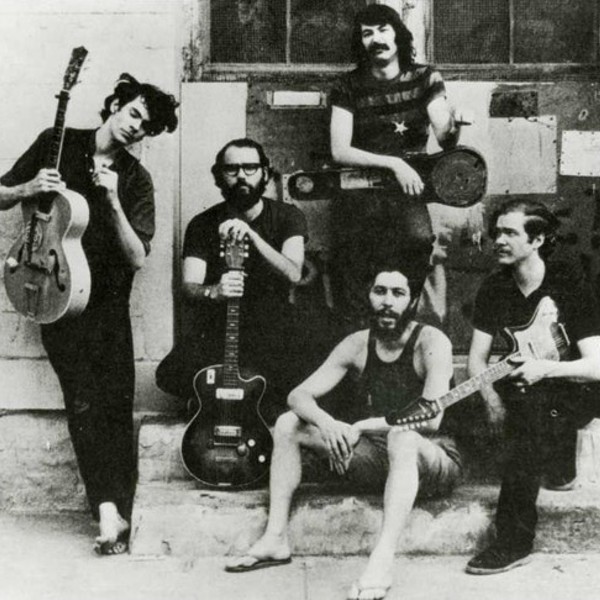Klump-thump. Klump-thump. Black boots on a flat board. Klump-thump. A twang. There’s a twang. Wiry plucks on a banjo’s neck. A darkness in the air. Dark words in a sweet voice. Words that warn against the dangers of too much drink. Words with a playful edge, a wry bite: “You’re mine, taste my fire / and your walls come tumbling down / You’re fine, I like you better / when you’re crawling on the ground.”
The boots, the voice, the banjo, and the words belong to Kelleigh McKenzie, who’s playing tonight to a packed, rapt room at New Paltz’s Unison arts center. The song, “Gin,” is off McKenzie’s outstanding recent debut, Chances (2008, Zatchubilly Music). There’s a bit of a quirky story behind it.
“I like to think of inanimate objects as having personalities,” says the svelte and striking singer-songwriter. “And the different kinds of alcohol each have their own personality. For instance, whisky is mean. Beer is lazy, slothful. Tequila, of course, is crazy. And gin is sneaky.” Indeed, the song’s sinewy, snaky main riff is a perfect match for the imagery of its cunning lyric. “Gin” is a catchy, clever masterpiece of form meeting function.
In a similar stroke of functional form, McKenzie grew up in a town whose very name mandates the eventual exodus of its youth: Boring, Oregon, an unincorporated logging community whose population topped out at 12,851 in the 2000 Census. “[Boring is] about half way between Portland and Mount Hood,” she says, adding, not exactly surprisingly, “There’s not a lot going on there.” Before her own exodus occurred, however, in addition to learning guitar and absorbing her father’s taste for jazz and the sounds of her older sister’s classic rock LPs, McKenzie inherited her Southern-born grandmother’s fondness for country music—though the latter genre is one to which she was initially resistant. “[Her grandmother] used to listen to the Carter Family and watch ‘Hee Haw’ on TV all the time,” remembers the singer. “But as a kid I just thought it was goofy. It wasn’t ’til later on that I totally fell in love with the classic country stuff, and I’m thankful that she exposed me to it. I always say I got the hillbilly-music gene from grandma.”
McKenzie came east to Pittsburgh to study acting at Carnegie Mellon University, where she found the curriculum edifying but grueling. “It was a very cut-throat, conservative program, designed to break down and rebuild the techniques of the students,” she explains. “So it really crushed a lot of kids, emotionally. But it ended up really helping to give me confidence and presence as a performer.” And, oddly, it was her time in the school’s acting program that also led to her picking up the five-string banjo. “We were doing a production of [the June Havoc-penned] Marathon ’33, which is about the dance marathons during the depression, like the one in They Shoot Horses, Don’t They?,” McKenzie recalls. “My character had to play a stringed instrument very poorly in one scene, and since I didn’t know how to play the banjo at the time that’s the instrument I chose; I’d also loved Steve Martin when I was younger, and he plays the banjo. Anyway, I ended up learning to play and even picked up on [traditional] claw hammer style from a banjo player I met after college. He also turned me on to Pete Seeger, who’s one of my biggest heroes, and I got even more deeply into folk music.”
As an aspiring actress, McKenzie spent the ’90s in New York, where, in addition to working the requisite odd and temp jobs, she understudied for and was cast in several Off-Broadway productions and a few “really awful, lo-fi cable TV sitcoms.” While soon growing frustrated with acting as a medium, she continued to write songs and play music for her own amusement. “With acting, I felt like I couldn’t say what I really wanted to say,” she recalls. “Plus the work is so inconsistent. When I was creating songs I was getting a rush of excitement that I wasn’t getting from acting.”
It was during her later New York period, however, that McKenzie’s musical aspirations would be sidelined by an unforeseen—and still unexplained—tragedy. In 1998, she suddenly developed a mysterious illness that affected her motor skills and resulted in bouts of crippling pain to her extremities, leaving her unable to hold or play an instrument. Her doctors were totally baffled, and the disease remains undiagnosed to this day. “At first, we thought it was some kind of repetitive motion injury, since I was doing a lot of office temp jobs where I was typing at the computer for long periods,” McKenzie says. “But it didn’t match up to the characteristics of those types of illnesses, and nothing we tried worked. [The doctors] were never able to figure out what it was or how to treat it, which was heartbreaking because I was just starting to get serious about my music.”
Finally, after nearly 10 physically and emotionally torturous years, McKenzie found she was able to control and divert the pain; she learned how to recognize the signs that precede its appearance and how to stave it off by drawing on her college lessons in the Alexander Technique, a system used by performers to improve breathing and movement and decrease stage fright and that is also used to alleviate pain. “I describe it has having a ‘relationship’ with pain,” says McKenzie. “I could backslide at any time if I don’t stay aware. But you learn to listen to your body and to accept and live with the limitations. It sends you deeper inward as an artist. And sometimes for me the physical pain is not as hard as the pain of not being able to play.”
In 2001 McKenzie and her husband Jeff Michne made the move from Manhattan to Rosendale, where she immersed herself in further developing her material.
In addition to finding another calling as a teacher at Music Together, the acclaimed syndicated program that introduces younger children to music, she began performing at local open mikes and singer-songwriter nights; one welcoming outlet was the long-running monthly John Street Jam in Saugerties, which is curated by Steve and Terri Massardo. “[McKenzie’s] songs are accessible without ever becoming predictable,” says Steve Massardo. “Sometimes you find yourself wondering how she came up with that chord or that curious interval, but it’s never done just to be quirky—it just happens to be Kelleigh’s way of expressing herself. She even gets her feet involved with a percussive porch board.”
The porch board, or stomp box, as McKenzie calls it, is a low, flat, hollow wooden platform made of wood on which the singer stands when she performs. But her thumping in place on the mini dais isn’t only designed to bring an addictive rhythm and rustic vibe to her songs, it also assists McKenzie in dealing with her episodic affliction. “Being in motion helps to break the pain cycle, so using the stomp box really helps with that,” she says. “I’m a big Chris Whitley fan, and he used a stomp box, too. So does Ray Bonneville; John Lee Hooker used one. It’s fun for me, and it adds another dimension to the shows.”
Released earlier this year, Chances, which was produced by Michne (he also plays guitar and percussion on the album), naturally reflects much of McKenzie’s own inner trials. But it also evokes the struggles seen in the lives of others, toils made apparent in her boldly minimal take of the Beatles’ anthem of loneliness, “Eleanor Rigby,” as well as in the supremely moving ballad “Underground.”
“‘Underground’ was inspired by a piece I heard on the NPR show ‘51 Percent’ while I was driving one day,” says McKenzie. “It was a story about Prajwala, an organization set up by Dr. Sunitha Krishnan in India to combat human trafficking and child prostitution and to rescue and rehabilitate the victims. There was an interview with this little girl who had been rescued from one of the brothels there, she’d had this horrible life as a sexual slave almost from the time she was born. But somehow she still had hope; there wasn’t any bitterness in the way she spoke or in anything she said. It hit me so hard that I just lost it, completely broke down. I actually had to pull off the road. And when I got home the song just poured out.”
But not all of the songs on Chances are so serious in tone. There’s the ringingly optimistic “O Mother,” the whimsical “The Bus Song,” even “Roark,” a loving and lighthearted ode to McKenzie’s so-named Australian shepherd. Since its release the disc has attracted much radio play as well as the enthusiasm of the local and international press. But perhaps what’s resonated most deeply with McKenzie as an artist has been the praise the album has brought from her peers, one of whom is banjo king Tony Trischka. “[Chances] is a work of art with eclectic and delicious production values,” says Trischka. “The kudos could go on and on, but just know that Kelleigh is a major talent, deserving of much wider recognition.”
And that recognition seems surely imminent, thanks both to McKenzie’s busy performing schedule and being selected as a winning artist in last month’s Mountain Stage NewSong Contest, which is sponsored by NPR’s popular roots music show “Mountain Stage”; in another segment of the same competition, “Gin” tied for best song—with, appropriately enough, Rose Polenzani’s “You Were Drunk and I Was There.” (McKenzie has been invited to appear on “Mountain Stage” in January.)
Her enigmatic illness may have thrown McKenzie a potentially devastating curveball, but it’s one she’s certainly knocked right out of the park. “It almost feels like living some kind of weird, archetypal myth or something,” she says, smirking and shaking her head in disbelief. “Like I was ‘smote down’ and humbled for some reason. But the process of dealing with it and finding my way back [to making music] has also given me some amazing gifts.”
Kelleigh McKenzie will perform with Patty Larkin at the Towne Crier in Pawling on November 14 and at the Northeast Region Folk Alliance Conference’s Tricentric Showcase in Kerhonkson on November 15. www.kelleighmckenzie.com.


















